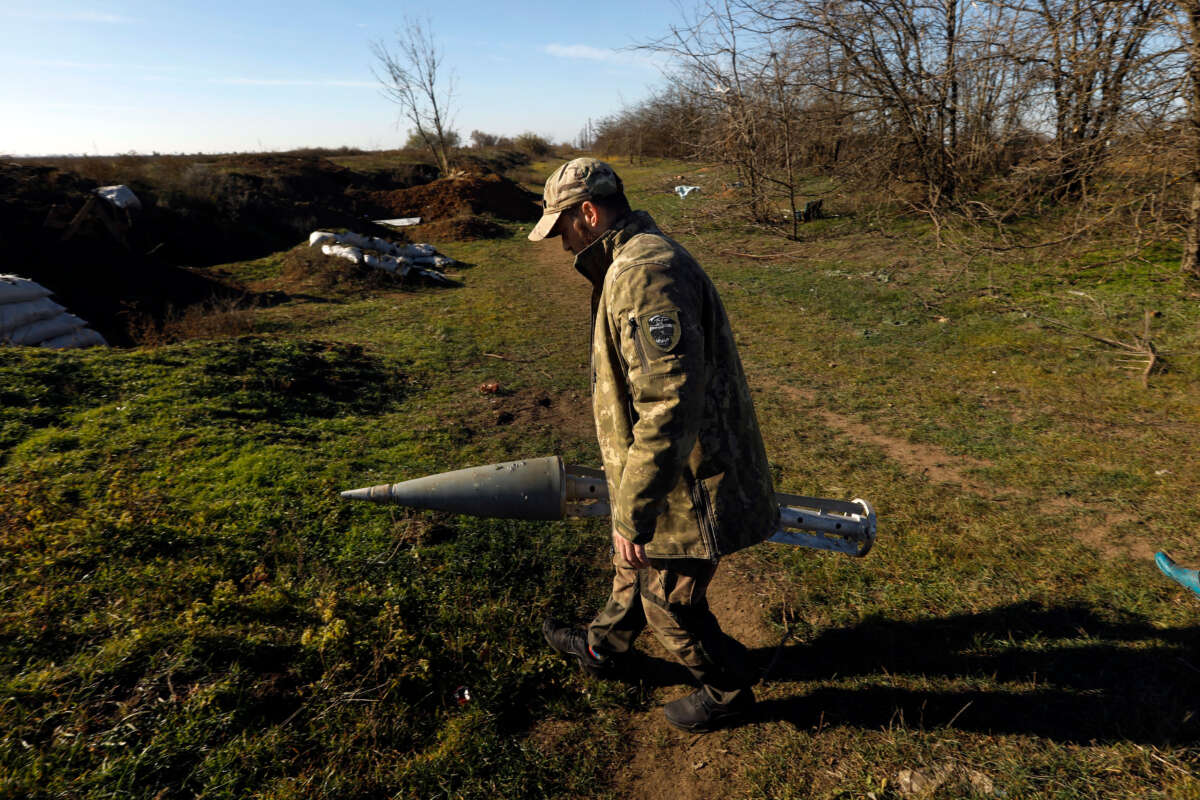Truthout is an indispensable resource for activists, movement leaders and workers everywhere. Please make this work possible with a quick donation.
An independent weapons watchdog on Thursday implored the Biden administration to abandon any plans it has to provide the Ukrainian government with cluster bombs.
While the White House has yet to finalize its decision, the State Department is expected to invoke a waiver under U.S. arms export laws that would allow stockpiled cluster munitions to be transferred to Ukraine, which is currently waging a counteroffensive against invading Russian forces.
In a statement, Arms Control Association executive director Daryl Kimball said that sending cluster bombs to Ukraine “would be escalatory, counterproductive, and only further increase the dangers to civilians caught in combat zones and those who will, someday, return to their cities, towns, and farms.”
“Some U.S. officials claim that these weapons ‘would be useful’ against mass formations of troops and armor or broad targets, such as airfields, and that they would allow Ukraine to concentrate their use of unitary warheads against higher-value Russian targets,” said Kimball.
“The reality is more complicated,” he continued. “Cluster munitions will not differentiate a Ukrainian soldier from a Russian one. The effectiveness of cluster munitions is significantly oversold and the impact on noncombatants is widely acknowledged, but too often overlooked.”
Kimball noted that “the limited military utility and the substantial humanitarian dangers of cluster munitions are among the key reasons why the Defense Department halted using them in Afghanistan in 2002 and Iraq in 2003, and has chosen to invest in alternative munitions.”
“It is why, in 2008, former Secretary of Defense Robert Gates issued an order to phase out by 2018 cluster munitions with an unexploded ordnance rate of greater than 1%, and it is why, in 2011, the Obama administration affirmed this policy,” said Kimball. “It is why Congress, in 2018, enacted a series of export restrictions on cluster munitions with a failure rate in excess of 1%.”
“The Pentagon has, unfortunately, dragged its feet and in 2017 the Trump administration announced the 2018 deadline for phasing out non-compliant cluster munitions would not be met,” he added. “No new deadline for meeting that goal was set by the Trump administration or the Biden administration.”
On the one-year anniversary of Russia’s invasion of Ukraine, President Joe Biden said, “The decisions we make over the next five years are going to determine and shape our lives for decades to come… a choice between chaos and stability.”
Kimball on Thursday referenced that February statement and said, “Rather than add to the chaos and side-step the rules of the global system, President Biden should have made it clear that cluster munitions need not and should not be part of the conflict in Ukraine, or in any war.”
As the Arms Control Association explains:
Cluster munitions are designed to disperse or release explosive submunitions, each of which weighs less than 20 kilograms, and includes those explosive submunitions. The U.S. stockpile includes dual-purpose improved conventional munitions (DPICMs), surface-to-surface warheads, and other types of older cluster munitions. Given that cluster munitions disperse hundreds or even thousands of tiny but deadly bomblets, their use produces significant quantities of unexploded submunitions that can maim, injure, or kill civilians and friendly forces during, and long after, a conflict.
The limited military value and the indiscriminate impacts of these weapons led the majority of the world’s countries to negotiate the 2008 Convention on Cluster Munitions. The treaty — which 123 nations have joined — prohibits State parties from developing, producing, acquiring, using, transferring, or stockpiling cluster munitions. While 23 NATO members are parties to the treaty, the United States, Ukraine, and Russia are not.
Human Rights Watch (HRW) has long documented the devastating consequences of U.S.-made cluster munitions in countries such as Serbia, Afghanistan, Iraq, and Yemen.
On Thursday, HRW released a new report detailing civilian harm and suffering caused by the use of cluster bombs throughout the war in Ukraine.
“Cluster munitions used by Russia and Ukraine are killing civilians now and will continue to do so for many years,” said Mary Wareham, the organization’s acting arms director. “Both sides should immediately stop using them and not try to get more of these indiscriminate weapons.”
A terrifying moment. We appeal for your support.
In the last weeks, we have witnessed an authoritarian assault on communities in Minnesota and across the nation.
The need for truthful, grassroots reporting is urgent at this cataclysmic historical moment. Yet, Trump-aligned billionaires and other allies have taken over many legacy media outlets — the culmination of a decades-long campaign to place control of the narrative into the hands of the political right.
We refuse to let Trump’s blatant propaganda machine go unchecked. Untethered to corporate ownership or advertisers, Truthout remains fearless in our reporting and our determination to use journalism as a tool for justice.
But we need your help just to fund our basic expenses. Over 80 percent of Truthout’s funding comes from small individual donations from our community of readers, and over a third of our total budget is supported by recurring monthly donors.
Truthout’s fundraiser ends tonight! We have a goal to add 143 new monthly donors before midnight. Whether you can make a small monthly donation or a larger one-time gift, Truthout only works with your support.
